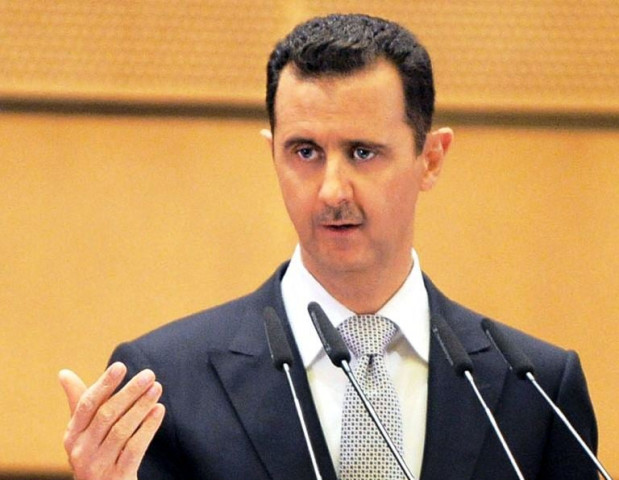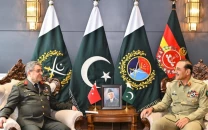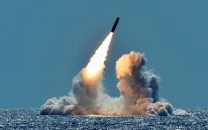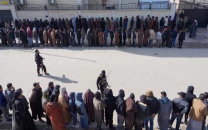Assad says West will pay for 'supporting' al Qaeda
Syrian President warned that a defeat of his government would spell demise of Syria, vows that he will not surrender.

Assad has repeatedly blamed enemies and conspirators for the deadly unrest rocking Syria. PHOTO: AFP/FILE
Assad, whose regime has been battling an uprising since March 2011, told state television Al-Ikhbariya in an interview that the West is playing with fire and that the conflict could also spill over into Jordan.
"The West has paid heavily for funding al Qaeda in its early stages. Today it is doing the same in Syria, Libya and other places, and will pay a heavy price in the heart of Europe and the United States," Assad said.
Last week, the jihadist rebel group Al-Nusra Front pledged allegiance to al Qaeda chief Ayman al-Zawahiri, who had previously urged rebels to establish an Islamic state in Syria.
Assad has repeatedly blamed enemies and conspirators for the deadly unrest rocking Syria, where the UN says more than 70,000 people have been killed over the past two years.
And he told Al-Ikhbariya that, "from the first day, what is happening in Syria is dictated from abroad."
"We are facing a new war, a new method" with fighters, some of whom are Arabs, not Syrians," the president said in the hour-long interview, adding that the "army is not fighting a war to liberate Syrian territory, but a war on terror."
"There is a bid to invade Syria with forces coming from the outside, of different nationalities, though they follow new, different tactics from those followed by those who came to colonise in the region, and from those used by the United States to occupy Iraq and Afghanistan."
"There is an attempt at cultural colonisation, meaning ideological invasion, in Syria, leading in one of two directions.
"Either Syria becomes subservient and submissive to the big powers and the West, or it becomes subservient to obscurantist, extremist forces. We need to hold on ever more strongly to the meaning of independence."
Assad did not spell out how he believed the West was supporting al Qaeda in Syria. The United States and EU countries have been loathe to fulfill rebel requests for arms for fear they might fall into the hands of extremists.
But he insisted that "everyone who carries weapons and attacks civilians is a terrorist, be they al Qaeda or not."
The regime has long used the word "terrorist" to describe those who have taken up arms against it.
Assad also warned that a defeat of his government would spell the demise of Syria, and vowed that he will not surrender.
"There is no option but victory. Otherwise it will be the end of Syria, and I don't think that the Syrian people will accept such an option," he said.
"The truth is there is a war and I repeat: no to surrender, no to submission."
As for his own future, he said that would be decided by the people.
"The position (of president) has no value without popular backing. The people's decision is what matters in the question of whether the president stays or goes," he said, suggesting he might stand for a new term in polls slated for next year.
Meanwhile, he said officials were laying the groundwork for a "national dialogue" and said "there are no red lines - except for the independence of Syria - on what can be discussed."
But he seemed to rule out those members of the opposition living abroad.
"In all the countries of the world an opposition has grassroots support... We have parties inside Syria.... (unlike other opposition forces), which does not represent the people."
Assad took to task neighbouring Jordan, which says it is hosting around 500,000 Syria refugees, accusing it of allowing rebels and arms free movement across its borders.
"I cannot believe that hundreds (of rebels) are entering Syria with their weapons while Jordan is capable of arresting any single person with a light arm for going to resist in Palestine," Assad said.
"We would wish that our Jordanian neighbours realise that... the fire will not stop at our borders; all the world knows Jordan is just as exposed (to the crisis) as Syria."
In Amman, Information Minister Mohammad Momani said the United States plans to deploy 200 troops in Jordan because of the war in neighbouring Syria "in light of the deteriorating situation in Syria."
This would be 50 more than those already there.
Violence across Syria killed at least 92 people on Wednesday, the Britain-based Syrian Observatory for Human Rights reported.



















COMMENTS
Comments are moderated and generally will be posted if they are on-topic and not abusive.
For more information, please see our Comments FAQ